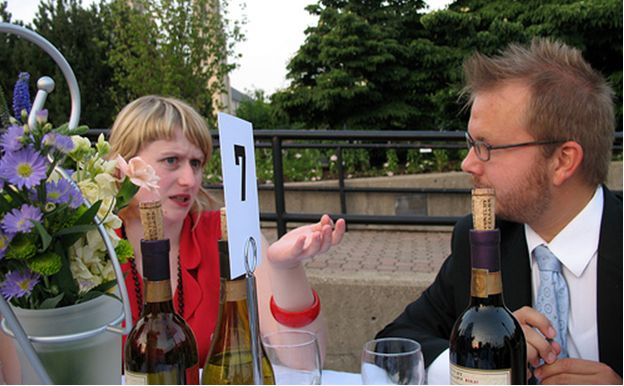 Underneath the mechanical techniques of listening, there is something much more powerful: the mindset, the set of attitudes, that you bring into a conversation.
Underneath the mechanical techniques of listening, there is something much more powerful: the mindset, the set of attitudes, that you bring into a conversation.
If you’re like most people, you don’t go into conversations with a conscious mindset. Rather you leave it to chance, and find that while some interactions go well, otherwise go poorly—and you don’t know why. Because your mindset has a major impact on the conversation, it’s worth paying attention to.
And herein lies the good news: when you consciously bring your best “listening gameâ€, with a great listening mindset, you’ll have a better experience. Here are two of my favorite mindset tips for enjoyable holiday listening.
Mindset #1: Goodwill
There you are, at a holiday party, talking with someone you’ve just met. Sometimes this is a person you take an instant liking to, and sometimes… it isn’t. I have news for you: they can tell. You may think you can hide it, but deep down, they can tell.
So here’s what you can do: leverage the power of mindset to find an authentic “source of goodwill†to bring into the conversation.
If you pause for a moment, you can find something to appreciate about anyone. You don’t have to say it out loud, but you can certainly make a point of noticing it, and using that appreciation to bring goodwill into the interaction.
Here’s an example. Once I was at a party listening to a young woman talk about her plans to start a new venture. I was taken aback by her bravado—while she outwardly claimed that she knew precisely how to make her venture a success, her ideas, experiences, and body language told me otherwise. I briefly considered asking her a tough question, but then thought “heck, it’s the holidays.†Instead I took a deep breath and looked for a point of goodwill.
And a funny thing happened—I found myself drawn towards her enthusiasm, energy, and positive thinking. That made it easy to project goodwill towards her and her efforts. I relaxed, I became more present and I had a new appreciation that wasn’t there a moment before. The resulting conversation was much more uplifting for me, and I think it was for her as well.
Mindset #2: Learning
There is a unique opportunity in really hearing somebody talk about how they see the world. While it sounds obvious, it’s easy to forget this simple fact: we all see the world differently. It takes a stance of humility to realize that there is much to learn from others.
This really hit home for me a few weeks ago when I was at a party talking with a guy who had extremely strong views… on everything. Although I was initially put off by his attitude, I had a niggling sense that there was something there for me to learn. Clearly he had a lot of passion for his work and for his world view.
So rather than walking away, I did something different. I made a conscious effort to channel a learning mindset. I strove to see his ideas from his perspective, without needing to have a debate about what was right. Sure enough, as I got more interested in exploring his ideas, he shared and developed them to a deeper level. I gained several great tidbits about how and why he’s successful in his business, that I wouldn’t have gained otherwise. My learning attitude, combined with his strong opinions, resulted in both of us having a thoroughly enjoyable conversation. What could have been a “pissing match†turned into a valuable learning experience for me.
I find that this attitude of learning, combined with respect, gives me a natural and curious engagement while listening that is good both for me and for the other person. In my experience, when I cultivate this attitude of learning, I’m able to connect with people who I wouldn’t connect with otherwise, and they tell me really interesting things.
A Final Encouragement
OK, so I’ve given you two listening mindsets to try, for the holidays and beyond. Now for the payoff. I’d like to encourage you to put one of these mindset into action in the coming week.Â
- Pick a mindset, goodwill or learning, and write it down somewhere that you’ll see it regularly.
- Make a point of consciously bringing that mindset into at least one conversation every day.
- At the end of a week, consider: How did it go?
If you can do this successfully, I believe that you’ll not just be a better listener, but you’ll also build better relationships with those around you.
Let me know how it goes! Post your experiences below, or drop me a line at contactpaul@supportivelistening.org. I always welcome questions, too.
Paul.



 After years of searching for a place to do Brazilian Jiu Jitsu, last year I finally found one—
After years of searching for a place to do Brazilian Jiu Jitsu, last year I finally found one— In great Supportive Listening conversations, there is often a special moment that I call “the tipping point of listening.†This is the point in the conversation when the speaker really gets it, that I’m creating space for them to solve the problem, and that I’m just not going to jump in with suggestions. And that’s the point when the speaker’s problem solving energy really gets going. I had a powerful experience around this just the other day.
In great Supportive Listening conversations, there is often a special moment that I call “the tipping point of listening.†This is the point in the conversation when the speaker really gets it, that I’m creating space for them to solve the problem, and that I’m just not going to jump in with suggestions. And that’s the point when the speaker’s problem solving energy really gets going. I had a powerful experience around this just the other day. Supportive Listening can bring out the beautiful and joyous in people. Although we tend to think about Supportive Listening as something we “do” when others are upset or unhappy, this way of relating to others aims, first and foremost, to help them explore, express, and accept themselves – the good, the bad, and the beautiful.
Supportive Listening can bring out the beautiful and joyous in people. Although we tend to think about Supportive Listening as something we “do” when others are upset or unhappy, this way of relating to others aims, first and foremost, to help them explore, express, and accept themselves – the good, the bad, and the beautiful.